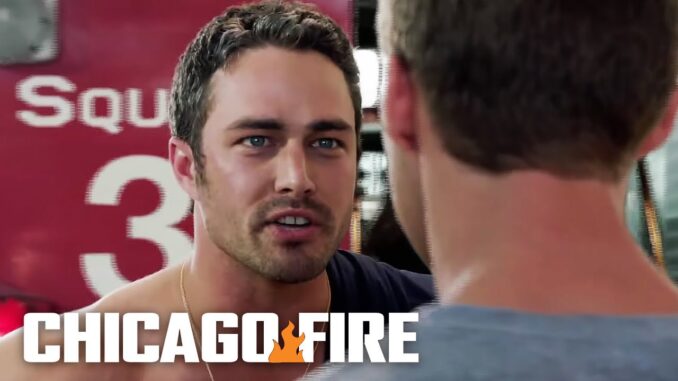
The Echoes in the Hallowed Halls: Chicago Fire’s Shocking Deaths That Still Have Fans Talking (md07)
From the moment the sirens wail and the flashing lights cut through the Chicago night, Chicago Fire has promised its viewers a world of heroism, camaraderie, and undeniable danger. It’s a show that prides itself on creating a family within the walls of Firehouse 51, making every viewer feel like a part of the crew. This deep emotional investment is precisely why certain deaths on the show don’t just register as plot points; they hit like a gut punch, leaving a lasting crater in the series’ narrative landscape and an enduring echo in the hearts of its fans. These are the shocking exits, often symbolized by an unnamed file like “md07” in the annals of devastating storylines, that continue to fuel discussions, re-watches, and collective sighs years after the final farewell.
Unlike many procedural dramas where character departures might be met with mild disappointment, a death on Chicago Fire carries a different weight. It’s a stark, brutal reminder of the high stakes involved in the characters’ chosen profession. These aren’t always deaths steeped in glorious sacrifice, either. Sometimes, they are sudden, chaotic, and senseless, mirroring the unpredictable nature of firefighting itself. This unflinching realism is a cruel surgeon’s scalpel, cutting deep into the viewer’s carefully constructed emotional safety net, demonstrating that even the most beloved characters are not immune to the inherent perils of the job.
Perhaps no death cemented this harsh reality more profoundly than that of Leslie Shay. Her exit in the Season 3 premiere was a seismic shock that reverberated through the entire fandom and irrevocably altered the show’s trajectory. Shay, with her quick wit, unshakeable loyalty, and pioneering spirit as a paramedic, was more than just a supporting character; she was the emotional anchor for Severide, the confidante for Dawson, and a vital pulse of Firehouse 51. Her death, caused by an explosion in an abandoned building – an ordinary call gone horribly wrong – wasn’t just sad; it was unjust. The senselessness of it, the unexpected nature, and the immediate, raw grief displayed by Severide, who carried her broken body out of the wreckage, left an indelible mark. To this day, fans revisit Shay’s episodes, mourn the future stories she could have had, and reflect on how her absence shaped every character, especially Severide, for seasons to come. Her spirit, her locker, her name, all remain powerful touchstones, keeping the conversation alive about the profound loss.
Years later, the show delivered another devastating blow with the demise of Brian “Otis” Zvonecek. Otis was the heart of the firehouse, often the comic relief, but also a deeply empathetic and earnest individual. His growth from a somewhat awkward, aspiring entrepreneur to a confident, indispensable member of Truck 81 was a journey fans cherished. His death during a boiler room fire, where he heroically tried to save a fellow firefighter, was a testament to his character. Yet, the scene of him, gravely wounded, whispering his last words in Russian to Cruz, followed by the agonizing moments of his comrades trying to save him, was pure, unadulterated heartbreak. The subsequent memorial, the permanent tattoo on Joe Cruz’s arm, and the empty bunk in the firehouse serve as constant, poignant reminders. Fans still talk about the “Otis Elevator” project that never came to fruition, the beloved character’s quirky inventions, and the gaping wound his absence left. His sacrifice, though heroic, felt intensely personal, a shared wound among the show’s community.
These deaths, whether it’s Shay, Otis, or other significant losses that fans categorize under the umbrella of “md07” – moments that tear the fabric of their fictional family – resonate for several reasons. Firstly, the show’s writing excels at building characters who feel like genuine people, flawed and relatable. We’ve seen their triumphs, their heartbreaks, their petty squabbles, and their unwavering support for one another. When one is taken, it feels like losing a friend. Secondly, these departures underscore the narrative integrity of Chicago Fire. The show refuses to shy away from the brutal consequences of its premise, adding a layer of authenticity that many dramas lack. Lastly, and perhaps most powerfully, these shared moments of grief foster a unique sense of community among the fans. Debating the “what ifs,” recalling favorite moments, and commiserating over the unfairness of it all becomes a collective act of remembrance, keeping the memory of these characters, and the emotional impact of their deaths, vividly alive.
In the end, the “shocking deaths that still have fans talking” are not merely dramatic plot twists. They are the crucibles in which the essence of Chicago Fire is forged: a show about a family that risks everything, knowing that not everyone will make it home. The “md07” represents not just a casualty, but a testament to the show’s power, an enduring whisper in the hallowed halls of Firehouse 51, ensuring that the fallen heroes are never truly forgotten, and their stories continue to echo in the hearts of those who watch.
